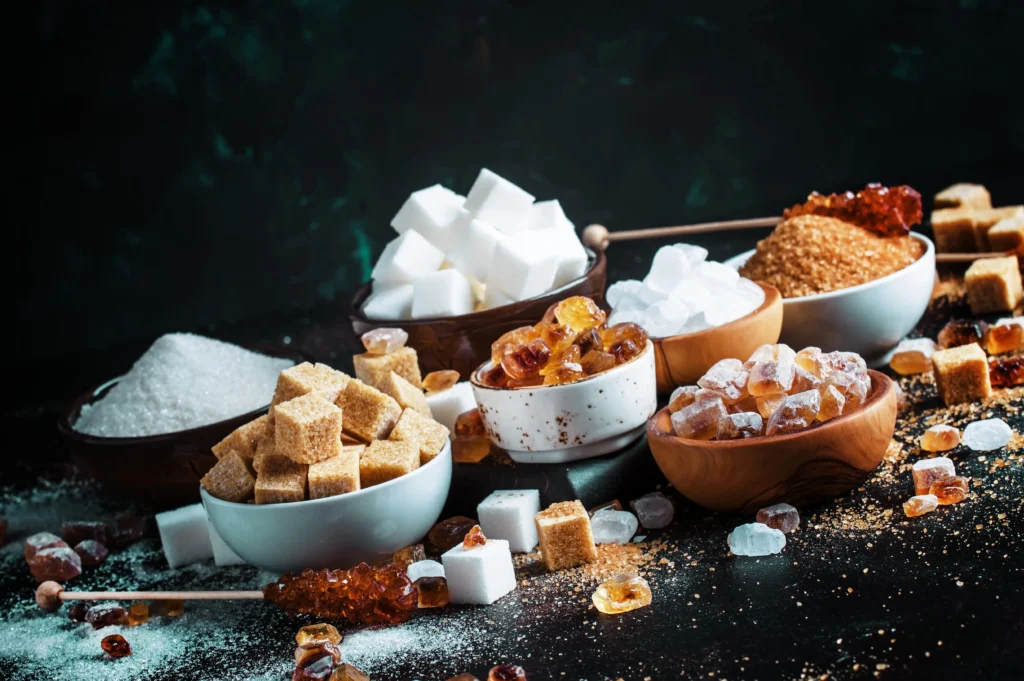When was the last time you checked the ingredient list on your favorite “sugar-free” snack or drink? Hidden in those tiny-font lists are fake sugars—chemical additives designed to mimic sweetness without the calories. While they may seem harmless, these sneaky ingredients can disrupt your metabolic health by interfering with blood sugar regulation, altering your gut microbiome, and fueling cravings.
By understanding the effects of fake sugars on energy, weight management, and overall well-being, you can make smarter dietary choices. Keep reading to uncover the hidden risks of these additives and learn how to support a healthier, more balanced lifestyle.

What Are Fake Sugars?
Fake sugars, also known as artificial sweeteners or non-nutritive sweeteners, are chemically engineered substances that mimic the sweetness of sugar without containing the same calories. On the surface, they sound like the perfect solution, but behind the bright packaging lies a story of complex chemistry and potential health risks.Here are some of the most common artificial sweeteners that frequently find their way into our food supply:
- Aspartame: Commonly found in diet sodas, sugar-free gum, and low-calorie snacks, aspartame is a widely used artificial sweetener that provides sweetness without calories. However, its potential impact on metabolic health and gut bacteria has raised concerns.
- Sucralose: This sweetener is a staple in baked goods, yogurts, protein powders, and various low-sugar foods. Despite being marketed as a healthier alternative to sugar, some studies suggest it may interfere with gut microbiota and insulin sensitivity.
- Saccharin: A key ingredient in many processed candies, low-calorie beverages, and sweetened condiments, saccharin has been used as a sugar substitute for decades. While it offers sweetness without calories, its effects on glucose metabolism and long-term health are still under scrutiny.
These sugar substitutes often lurk in “health-conscious” or “diet” foods, making it crucial to read labels and understand their potential effects.Initially introduced as a calorie-free alternative, these sweeteners quickly became a staple in processed foods and beverages marketed toward health-conscious consumers. Now they’re everywhere—often in places you wouldn’t expect.
The Hidden Link Between Fake Sugars and Metabolic Health
Here’s where things get concerning. Far from being harmless sugar substitutes, research has uncovered that fake sugars may disrupt our body’s natural metabolic processes.
According to a review published in the Journal of Nutrition, fake sugars can alter gut bacteria, which play a huge role in metabolic health. This imbalance has been linked to weight gain, insulin resistance, and even an increased risk of type 2 diabetes. For example, a study by the American Heart Association found that people who regularly consumed beverages with artificial sweeteners were more likely to develop metabolic syndrome over time.
Even aspartame, one of the most popular sweeteners, has been scrutinized. A clinical trial in the American Journal of Clinical Nutrition revealed that it might interfere with glucose metabolism, contributing to inflammation. While science is still evolving, the message is clear—it’s worth being cautious.
Sneaky Sources of Artificial Sweeteners in Everyday Foods

Think artificial sweeteners are just in diet sodas? Think again. These sugar substitutes often hide in plain sight, lurking in foods you might never suspect. Here are some surprising places where fake sugars can be found:
- Condiments: Even savory staples like ketchup, barbecue sauce, and salad dressings often contain added artificial sweeteners to enhance flavor without adding sugar.
- Low-Fat or “Healthy” Yogurts: Many low-fat or “diet” yogurts marketed as healthy alternatives are loaded with artificial sweeteners to compensate for the lack of fat.
- Protein Shakes and Bars: Products marketed as “clean” or “high-protein” frequently include sucralose, aspartame, or sugar alcohols to create a sweet taste without extra calories.
- “Sugar-Free” or “Low-Carb” Baked Goods: From cookies to muffins, sugar-free or low-carb baked goods often rely on artificial sweeteners to maintain sweetness while meeting dietary claims.
- Chewing Gum and Mints: These seemingly harmless snacks are almost always sweetened with sugar substitutes like sorbitol or aspartame to create their long-lasting sweetness.
How to Steer Clear of Hidden Sugars
To avoid unintentional consumption of artificial sweeteners, make a habit of reading ingredient labels carefully. Watch for names like aspartame, sucralose, sorbitol, and acesulfame potassium. If the ingredient list reads like a chemistry textbook, it might be best to leave that item on the shelf. Prioritizing whole, minimally processed foods is an effective way to reduce exposure to these sneaky additives.
Healthier Alternatives to Fake Sugars
You don’t need to swear off sweetness entirely—there are plenty of healthier, more natural options that taste great without compromising your metabolic health.
Here are a few to consider:
- Honey or Maple Syrup (in moderation): Adds flavor and nutrients without overloading your system.
- Stevia or Monk Fruit Extract: Plant-based sweeteners that are naturally derived and calorie-free.
- Coconut Sugar: A less-processed option with trace minerals.
Beyond swapping sweeteners, try focusing on whole, unprocessed foods. For instance, fresh fruits not only satisfy your sweet tooth but also come packed with fiber, vitamins, and antioxidants—all things fake sugars can’t deliver.
Real-Life Stories and Expert Insights
These aren’t just hypotheticals. Take Rachel, a long-time diet soda fan who struggled with stubborn weight gain despite cutting calories. “I decided to ditch artificial sweeteners for 30 days,” she shared, “and it was like flipping a switch—my energy levels improved, and I finally started losing those extra pounds.”
Experts echo these observations. Dr. Anne Torres, a metabolic health researcher, emphasizes, “Your body wasn’t designed to process fake sugars. While they may save a few calories now, they could lead to bigger metabolic issues down the road.”
Studies support this. For example, research in Nutrition and Metabolism found metabolic health markers significantly improved in participants who reduced both artificial and added sugars. It’s proof that small changes can lead to big health benefits.
How to Take Action Today
Wondering where to start? Here’s your game plan for tackling fake sugars and improving your metabolic health:
- Audit your pantry and fridge. Look for items hiding artificial sweeteners and replace them with natural alternatives.
- Read labels like a pro. A quick glance can save you from consuming unnecessary chemicals.
- Mind your beverages. Many drinks, even those marketed as “healthy,” are riddled with fake sugars. Opt for water infused with fresh fruit or herbal teas instead.
- Focus on whole foods. The less processed your diet, the fewer hidden ingredients you’ll encounter.
- Treat yourself mindfully. If you do indulge in sweet treats, make them occasional and opt for ones with natural sweeteners.
The Ripple Effect of Metabolic Health on Your Well-Being
Your metabolic health is the cornerstone of your overall wellness. It affects everything—from your energy levels and mood to your weight, immune function, and even your risk for chronic diseases. When artificial sweeteners sneak into your diet, they can disrupt this delicate balance, potentially impacting your body’s ability to regulate blood sugar, manage cravings, and maintain a healthy gut microbiome.
By recognizing the hidden dangers of fake sugars and making informed dietary choices, you empower yourself to take control of your health. Small, consistent steps—like reading labels, opting for natural sweeteners in moderation, and prioritizing whole foods—can make a significant difference in your metabolic health and overall well-being.
Join the Conversation
Curious about the science behind fake sugars and their impact on your health? Or have you successfully reduced your intake and noticed a change? We’d love to hear your thoughts and experiences! Drop a comment below or share this article with others to spark a meaningful discussion.
By raising awareness and supporting one another in making smarter choices, we can build a healthier, more informed community. Together, we can inspire positive changes—for ourselves and for those around us.
Frequently Asked Questions (FAQs)
Q: What are fake sugars, and why should I avoid them?
A: Fake sugars, also known as artificial sweeteners, are synthetic sugar substitutes found in many processed foods and beverages. While they may satisfy sweetness cravings without extra calories, research suggests they can disrupt metabolic health, affect gut bacteria, and potentially lead to long-term health concerns.
Q: Are natural sweeteners a better alternative?
A: Natural sweeteners like honey, maple syrup, or stevia can be healthier options in moderation. They’re less processed and often contain trace nutrients, but it’s still important to consume them sparingly to avoid excess sugar intake.
Q: How can I identify fake sugars in my diet?
A: Check ingredient labels carefully. Common artificial sweeteners include aspartame, sucralose, saccharin, and acesulfame potassium. They’re often used in “sugar-free” or “low-calorie” products like diet sodas, candies, and snack foods.
Q: Is it hard to reduce fake sugars in my diet?
A: Transitioning away from fake sugars takes time and mindfulness. Start small by swapping out heavily processed snacks with whole foods, and experiment with naturally sweet options like fruits. Over time, your taste buds will adjust, and you’ll likely find it easier to enjoy foods with less added sweetness.
Q: Will reducing fake sugars really improve my health?
A: Many people report positive changes when they cut back on artificial sweeteners, such as better energy levels, improved digestion, and more stable blood sugar. While individual experiences vary, reducing fake sugars is a proactive step toward overall wellness.
